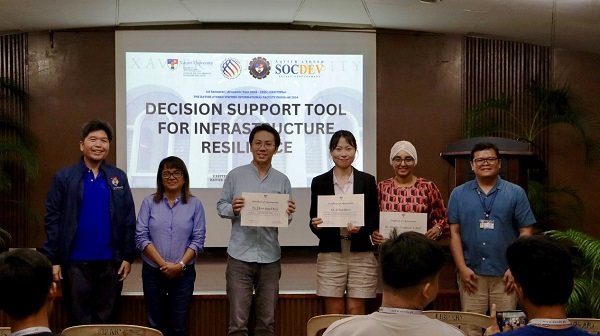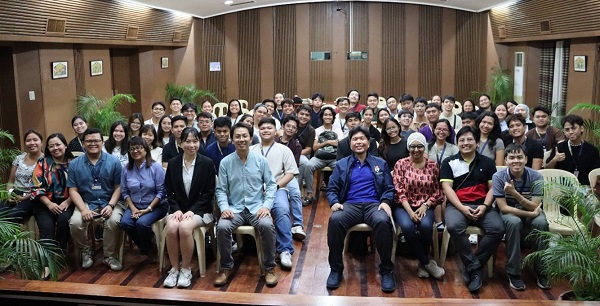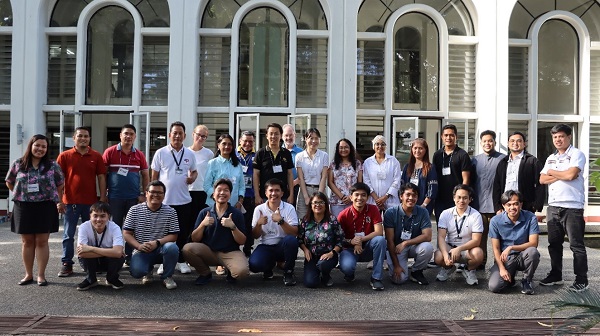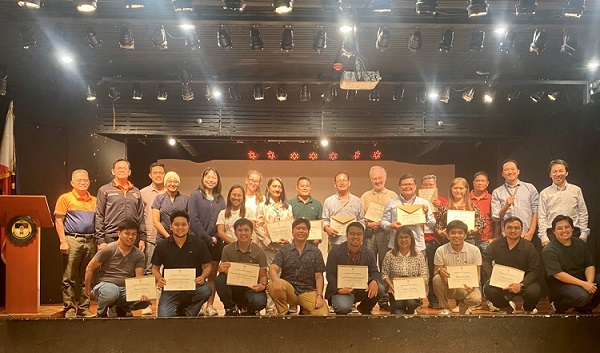 Distinguished researchers and resource persons on infrastructure resilience together with XU Faculty, [L-R]
Distinguished researchers and resource persons on infrastructure resilience together with XU Faculty, [L-R]
Engr Dexter Lo (XU), Dr Anabel Abuzo (XU), Prof Darren Chian (NUS), Dr Ji-Eun Byun (UoG), Dr, Ahsana Parammal
Vatteri (UCL), and Engr/EnP Jefferson Vallente Jr (XU).
Xavier Ateneo has partnered with the University College London (UCL), the University of Glasgow (UoG), and the National University of Singapore (NUS) to host a weeklong training aimed at equipping resilience practitioners and students with cutting-edge decision support tools for infrastructure resilience. The training spanned from 2-5 September 2024 and concluded with a forum on 6 September 2024. The event is part of the novel project: “Affordable and Accessible Decision-Support Tool Against Hazard Risks for Local Communities in Developing Countries” under the UNESCO Chair for Disaster Risk Reduction and Resilience Engineering (DRR-RE) and funded by the Institute for the Public Understanding of Risk (IPUR). The weeklong event included interactive lectures, field exercises, and workshops featuring distinguished researchers and resource persons, to wit: Engr Dexter Lo and Engr Gail de la Rita of Xavier University, Dr Ahsana Parammal Vatteri of the UCL, Dr Ji-Eun Byun of UoG, and Prof Darren Chian of NUS. The resource persons generously shared their expertise on risk analysis and disaster risk reduction throughout the training sessions.
 Students from the College of Engineering under the Civil Engineering program participated in the Visiting
Students from the College of Engineering under the Civil Engineering program participated in the Visiting
International Faculty Lecture on Infrastructure Systems Resilience.
The first day was a lecture series dedicated to Xavier Ateneo students from the College of Engineering under the Civil Engineering program. The lectures from visiting international faculty highlighted the topics of geotechnical risk analysis, infrastructure systems resilience, and quantitative risk analysis. Facilitated by Engr Jefferson R Vallente Jr, faculty member of the College of Engineering – Civil Engineering Department, the first-day session focused on equipping the next generation of engineers with the necessary skills to develop resilient infrastructures. The session further provided a platform for students to engage with the resource persons in knowledge-sharing and interactive discussion.
The following days of the lecture series provided technical training for engineers, planners, and resilience practitioners on infrastructure resilience. The technical training workshop was facilitated by Ms Therese Rhea Rose Baliwag-Vallente, Assistant to the Vice President for Social Development. A total of twenty-two (22) resilience practitioners from various government and academic institutions completed the training, to wit: faculty members of the XU College of Engineering – Civil Engineering, administrators from the XU Administration Cluster and Campus of the Future, Department of Education – Region 10 (DepEd 10), Department of Public Works and Highways – Region 10 (DPWH 10), Department of Science and Technology – Region 10 (DOST 10), and LGU Cagayan de Oro’s City Disaster Risk Reduction and Management Department (CDRRMD), City Housing and Urban Development Department (CHUDD), and Office of the Building Official (OBO).
 Training participants together with the Resource Team of the technical training on decision support for
Training participants together with the Resource Team of the technical training on decision support for
infrastructure resilience
In his project overview, Engr Dexter Lo, XU Vice President for Social Development, highlighted the critical role of collaboration between the academic sector and the government in building a resilient community. He emphasized that the project’s ultimate goal is to develop a state-of-the-art decision support tool focused on affordable, accessible measures to enhance local resilience. The in-depth workshop covered topics on the Cagayan de Oro risk profile, quantitative and geotechnical risk analyses, and risk communication. To ensure practical learning and application, the workshop included actual field exercises at East City Central School using tools on GLOSI and PARNASSUS and a geotechnical survey at the vicinity of the CDO Pelaez Bridge.
 Training participants engaged during the actual field exercises at East City Central School (left) and Pelaez Bridge (right)
Training participants engaged during the actual field exercises at East City Central School (left) and Pelaez Bridge (right)
The training concluded with a forum on affordable, accessible, and effective local disaster resilience which was participated by students, government leaders, and stakeholders and hosted by Ms Keziah Loucille Mallorca, Formator from the Social Involvement and Advocacy Program (SIAP). A key highlight of the forum was the recognition and awarding of certificates to training completers, with select participants sharing insights and lessons gained from the technical training.
Engr Glenn Leandri Brylle Lamparas, Supervising Science Research Specialist of DOST-10, shared his appreciation of the studies and tools introduced during the workshop.
“I believe the models and tools shared to us from the training are the future of local resilience. It is important for us, local resilience practitioners, to understand, localize, and apply our learnings in advocating for resilience in our local communities.”
Meanwhile, Mr Reian Christopher Paraguya PG, Local Disaster Risk Reduction and Management Officer of LGU CDO – CDRRMD, stated that Cagayan de Oro’s recognition as the most resilient city among the highly urbanized cities and municipalities in the recent Cities and Municipalities Competitiveness Index is attributed to partnerships and collaborations acquired throughout the years, especially with Xavier Ateneo. He further underscored the importance of collaboration and knowledge-sharing in strengthening disaster resilience.
“…realizing how technology can help in quantifying risks for better decision-making. The fact that you can get a fragility curve and vulnerability function just from a taxonomical scale is very helpful as it cuts costs and saves time without compromising data quality but quantitatively assessing a school building’s seismic vulnerability.”
Lastly, Dr Anabel Abuzo, Director of XU Engineering Resource Center (XU-ERC), shared that “the training workshop expanded our horizon of understanding what resiliency is about and the risk that is very vital to our promotion of disaster resilience application.”
 Stakeholders and training participants during the Forum on Affordable, Accessible, and Effective Local
Stakeholders and training participants during the Forum on Affordable, Accessible, and Effective Local
Disaster Resilience
As the forum progressed, key stakeholders were invited to share their impressions on the presentations, focusing on risk challenges and perspectives. As he shared his impression, RD Antonio Sugarol, Regional Director of Office of Civil Defense – Region 10 (OCD – 10), highlighted that “engineering solutions, that are consistent to the provisions of the National Building Code, is very important in building infrastructures resilience. The Regional DRRM Council is very much aware that we need to do something – so we can prepare ourselves by knowing the risks and strengthening resiliency.”
Meanwhile, Mr Ryan Blanco, DRRM Coordinator of DepEd – Cagayan de Oro, conveyed his appreciation to the UNESCO Chair for DRR-RE team for the continuous efforts in advocating for knowledge-sharing and in fostering resilience in local communities. “Your unwavering dedication in empowering local governance, institutions, and schools like ours, has provided us central insights in safeguarding not just physical infrastructures, but the very essence of our city’s futures – our children our teachers, and our schools.”
Lastly, Mr Cesar Pagapulaan Jr, Department Head of LGU Cagayan de Oro’s CHUDD, recognized the relevance of the training workshop and forum as the city gears up for urbanization. He shared that while CHUDD does not facilitate the construction of housing units, it is very relevant as the Department is gearing up and pushing for a condominium-type resettlement site for informal settles. He further expressed, “…our housing should be FAIR – Flexible, Affordable, Innovative, and Responsive. Right now, we should add another R and S for Resilient and Safe.”
The Forum provided an avenue for interactive discussion and sharing of ideas among the key stakeholders present. The Forum also introduced the Master of Geomatics in Disaster Risk Reduction, a graduate study program focused on climate and disaster risk reduction, management, and resilience. As the Forum drew to a close, UNESCO Chair for DRR-RE Prof Dina D’ Ayala gave her closing message. She emphasized that “collaboration is a significant step toward ensuring that our infrastructures and local communities are resilient and adaptive to the changing environment.”
The training on infrastructure resilience is a testament to Xavier Ateneo’s commitment to global partnership and innovative thinking in building resilient and sustainable communities.
Related story: